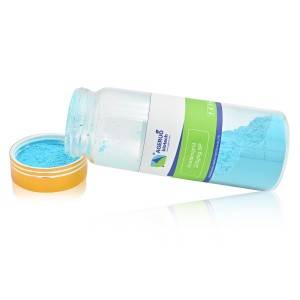Aphids, a class of pests that are extremely harmful to crops such as wheat. They not only can suck plant sap directly, affecting the normal growth of crops, but also can transmit a variety of plant viruses, further aggravating the harm. As a pesticide supplier, we will discuss the damage of aphids and their control methods in detail.
Aphids
Aphids are small insects belonging to Homoptera (Aphididae). They are usually 1-10 mm long, soft-bodied and come in a variety of colors, including green, yellow and black.

Aphid life habits
Aphids prefer warm and humid environments, and mainly suck plant sap through their stinging mouthparts. They reproduce rapidly, and can complete multi-generation reproduction in a year, especially in the appropriate climate conditions, the number of aphids can increase rapidly.
Hazards of aphids
Sucking plant sap
Aphids suck plant sap from wheat leaves, stalks and spikes by piercing them with their stinging mouthparts. This results in inhibited growth, yellowing and curling of the leaves, and in severe cases, wilting of the entire plant. Imagine a healthy wheat suddenly becoming malnourished and the entire harvest of the field in jeopardy.
Spreading disease
Aphids are vectors of several plant viruses, such as yellow dwarf virus. In the process of sucking the sap, aphids can transmit the virus to healthy wheat plants, which can lead to widespread spread and epidemics of virus diseases. This situation is like an epidemic in a farm field, and once it spreads, the consequences are unimaginable.
Production of honeydew
Aphids secrete large quantities of honeydew while feeding on wheat sap. This honeydew not only contaminates the wheat, but also attracts other pests such as ants, and the build-up of honeydew encourages the growth of molds and mildew, resulting in the formation of coal stain, which further affects photosynthesis and respiration in the wheat. Honeydew is like “dessert” for aphids, but it is a disaster for wheat.
Rapid reproduction
Aphids reproduce very quickly, usually within a few weeks in warm climates. If left unchecked, aphid populations can increase rapidly and cause serious damage to wheat. It is like a sudden storm that quickly sweeps across the farmland.

Aphid control measures
Agricultural control
Crop rotation and intercropping
Aphid breeding can be effectively reduced by crop rotation and intercropping. Crop rotation destroys the aphid’s habitat and reduces its chances of reproduction.
Physical control methods
Physical methods such as yellow sticky boards and insect nets can effectively capture and reduce the number of aphids. This method is simple, efficient and non-polluting.
Biological Control
Utilization of natural enemies
Utilizing natural enemies of aphids such as ladybugs and lacewings can effectively control the aphid population. This method is not only environmentally friendly, but also maintains ecological balance.
Application of biological insecticides
Biological insecticides such as BT bacteria and fungal insecticides have better control effect on aphids and are environmentally friendly.
Chemical Control
Imidacloprid
Imidacloprid is a highly efficient systemic insecticide with good control effect on aphids. Commonly used 10% imidacloprid wettable powder 1000-1500 times liquid spray.
| Name | Imidacloprid |
| CAS Number | 138261-41-3;105827-78-9 |
| Chemical equation | C9H10ClN5O2 |
| Type | Insecticide |
| Shelf life | 2 Years |
| Formulations | 70% WP, 10% WP, 25% WP, 12.5% SL,2.5%WP |
Acetamiprid
Acetamiprid is a broad-spectrum insecticide with strong poisoning effects on aphids by touch and stomach. Commonly used 10% acetamiprid wettable powder 1000-1500 times liquid spray.
| Product Name | Acetamiprid |
| CAS Number | 135410-20-7 |
| Molecular Formula | C10H11ClN4 |
| Type | Insecticide |
| Brand Name | Ageruo |
| Place of Origin | Hebei,China |
| Shelf life | 2 Years |
| The mixed formulatiion products | Acetamiprid 15% + Flonicamid 20% WDG Acetamiprid 3.5% + Lambda-cyhalothrin 1.5% ME Acetamiprid 1.5% + Abamectin 0.3% ME Acetamiprid 20% + Lambda-cyhalothrin 5% EC Acetamiprid 22.7% + Bifenthrin 27.3% WP |
| Dosage Form | Acetamiprid 20% SP, Acetamiprid 50% SP |
| Acetamiprid 20% SL, Acetamiprid 30% SL | |
| Acetamiprid 70% WP, Acetamiprid 50% WP | |
| Acetamiprid 70% WG | |
| Acetamiprid 97% TC |
Integrated control strategy
Eco-friendly control strategy
Comprehensive use of agricultural control, biological control and chemical control methods can effectively control the aphid population and reduce the pollution of the environment.
Advantages of integrated control
The integrated control strategy can not only effectively control aphids, but also reduce environmental pollution and protect the ecological balance, which is a sustainable control method.
Conclusion
The damage of aphids to wheat is obvious, and the control of aphids is essential to ensure healthy growth and improve yield of wheat. Through the comprehensive use of agricultural control, biological control and chemical control methods, we can effectively control the number of aphids and guarantee the healthy growth of wheat.

Frequently Asked Questions
What are aphids?
Aphids are small insects belonging to the family Aphididae, which cause damage to crops by sucking plant sap.
What is the main damage of aphids to wheat?
Aphids suck wheat sap, spread diseases, produce honeydew and reproduce rapidly, causing serious impacts on the growth of wheat.
How can aphids be effectively controlled?
Aphids can be effectively controlled through agricultural control (crop rotation, intercropping), biological control (using natural enemies, biocides) and chemical control (using specific insecticides).
What are the commonly used insecticides for aphid control?
Commonly used insecticides for aphid control are imidacloprid, acetamiprid, allylcarbamate and fludioxonil.
Post time: Jun-28-2024






